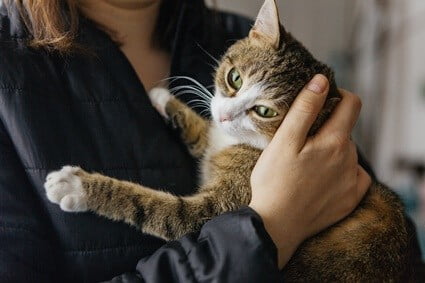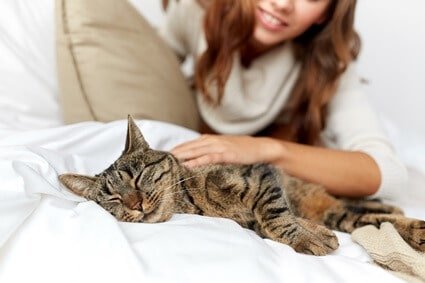Cats are often considered asocial pets that don’t need much attention. The truth is that cats are very affectionate and thrive off human affection and petting. Providing your cat with attention every day is important as doing so will develop the relationship between you and your cat.
Cats need a minimum of 10-15 minutes of attention every day. Ideally, your cat should receive 20-30 minutes of attention daily, as attention provides enrichment. This enrichment is vital to the development of a healthy, social cat. Not only does attention provide physical and mental stimulation, but it also strengthens the bond between you and your cat. Cats do form social bonds, and this is critical to remember when adopting a kitten. Cats that crave attention will vocalize excessively and seek out people. Cats not receiving enough attention may exhibit destructive behavior amidst other worrisome habits.
There are many ways of being attentive to your cat. Cats will happily spend an afternoon relaxing with you on the couch. You can also play with your cat, train it, and pet it. This will keep your cat healthy and socialized.
Why Do Cats Need Attention?
Cats are often thought of as an aloof pet that doesn’t need much attention. This idea couldn’t be further from the truth. A domestic cat will have its own personality, yes. However, almost all domestic cats raised correctly will show owners affection and love. Often, a cat will crave them.
Cats do form social bonds. Feral colonies even form extensive social structures, according to The Welfare of Cats. As for domestic cats, studies have found that cats form strong, emotional bonds with their owners. This bond is similar in strength to those that dogs form, although not expressed in quite the same way.
A cat needs attention from its owner to reinforce this bond. Attention also provides enrichment, social interaction, mental stimulation, and builds affection. A cat that does not receive enough attention may become asocial, destructive, and not feel comfortable in your home or presence.
Every cat will need a minimum amount of 10-15 minutes of attention each day. This does not all have to be in one go but can be peppered throughout the day. However, keep in mind that this is on top of daily maintenance, such as feeding, refilling water dishes, and cleaning litter boxes. Attention equals enrichment on its most basic level.
It is recommended that adult cats receive between 20-30 minutes of attention every day.

How Much Attention Do Kittens Need A Day?
Kittens require lots of attention. More so than the recommended 20-30 minutes above. Kittens are full of energy and curiosity, and they need attention for a large portion of the day. Between the ages of 2 months to 4 months, kittens will need near-constant enrichment and attention. This is especially true for kittens adopted solo that lacks a playmate.
The American Zoologist stated that social play is key between kittens as it provides exercise and develops social behavior. This social environment and attention between littermates are critical to a kitten’s mental development. It also teaches it appropriate ways to play and behave.
Providing your kitten with attention is also critical for forming a human-cat bond. This bond will shape the lifelong relationship you have with your cat.
Kittens of adopting age will need attention almost all day. This can come from yourself, someone in your family, or another kitten. In adopting a kitten, you are essentially becoming its new parent. It will look to you for affection, attention, guidance, and reassurance. Not providing this lessens your bond and can also result in the cat becoming anxious.
As a kitten grows, it will become more independent and need less supervision. Typically, this will only begin to happen once it turns 6 months of age. A kitten is considered an adolescent at 6 months of age and an adult at 1 year. Regardless of how old a kitten is, it will need hours of attention every day.
Signs That Your Cat Wants More Attention
A cat will usually tell you when it wants more attention. There are also signs that you can watch for that indicate it needs more attention.
Crying And Excessive Vocalization
Lund University states that there is cross-species communication specific to cats and humans. Adult cats rarely vocalize to other adult cats. However, a domestic cat will frequently talk to its owner.
When your cat talks to you, it is trying to tell you something. It likely wants attention for a variety of reasons. It may be hungry or lonely. It may want cuddles. There are all manner of reasons why your cat may be talking to you. Excessive talking or crying may mean that your cat wants to spend more time with you. A young kitten will frequently cry if left alone, especially if it’s a solo cat.
Destructive Behavior
Destructive behavior often arises when a cat is bored or has not been taught appropriate behavior. This behavior can include:
- Knocking items off of tables or shelves
- Scratching at furniture
- Chewing house plants
- Excessive grooming
- Pica, which is eating non-food items
A cat displaying one or more of these signs is likely bored and under-stimulated. It wants and needs more enrichment and attention.
Contact
A treasured moment for many is when their cat curls up in their lap. It’s a sign of trust and affection. When your cat makes contact with you, it is showing affection and may want attention. This contact could be:
- Butting its head or rubbing its face against you
- Placing its paw on you
- Curling up on or beside you
- Rolling onto its back and showing you its belly
- Pushing against you
- Sit on your book or laptop (or any other object you are focused on)
A sign of the desire for attention is your cat sitting outside your door or wanting to be in the same room as you.
Depression
Cats can become depressed, and a lack of attention or enrichment can be a cause. The signs of depression in cats can include:
- A lack of appetite
- Sleeping unusual amounts
- Poor grooming or excessive scratching
- A lack of interest in play or other activities
- Low-pitched, mournful meows
- Abnormal aggression or anxiety
Paying more attention to your cat can help ease these symptoms. It is also worth it to reach out to a vet for help in these cases.
Gifts
Cats do practice gift-giving. If a cat brings you a dead animal or toy, it’s either:
- Trying to feed you because it thinks you can’t hunt
- Seeking attention for a job well done
It may be confronting to receive a dead bird as a gift, but it’s important not to punish the cat. It’s trying to help and take care of you.
How To Give Your Cat Attention
Depending on the age and individual personality of your cat, some ways will work better than others.
Brushing and Petting
Grooming between cats is usually a gesture of affection. As one cat grooms another, it is marking it with its scent. Brushing or petting your cat is a way to bond and show attention while also maintaining its fur.
Your cat may let you know when it wishes to be pet by seeking you out. Otherwise, you can approach it and offer pets. Cats will learn to recognize a brush if you use it consistently as well.
Grooming is an important behavior between a mother cat and her kittens, and also between those kittens. From these moments, kittens learn how to clean themselves and treat others.
If you adopt a kitten, it is important to conduct grooming and petting sessions. This attention comforts the kitten and grows a bond between it and yourself. A full-sized brush may intimidate a kitten. Try combing your fingers through its fur or a small brush designed for smaller animals.
Your cat may also groom you by licking or nibbling on you. Typically, cats only do this with a person it has affection for.
Play Enrichment
Play is one of the most important enrichments a cat of any age requires. It is an essential form of attention that cat owners must provide. Toys and play do more than give a cat exercise, it allows it to enact natural behavior. This helps a cat feel fulfilled and prevents boredom. Being played with also encourages the cat to
Every cat will have its own way it likes to play. Try various toys, games, and other enrichment tools, like cat towers and automatic laser pointers.
Kittens will love this sort of attention. It will also burn lots of energy and tire them out.
Training
Training your cat is a great way to spend time with them and offer mental enrichment. You can train your cat to follow commands, play certain games, and play fetch. Once your cat has learned a few commands, you can enact them for enrichment.
Training also happens with young kittens when you housetrain them.
Napping
If you have been looking for an excuse to take a nap, here it is: napping with your cat is a bonding experience.
Cats only sleep near, beside, or on you if they feel safe with you. Taking a Sunday afternoon nap on the couch with your cat is a bonding experience. As is allowing your cat to nap on you. This is perhaps one of the easiest ways to pay attention to your cat.
If your cat is really happy, it will purr. It may also knead.

Communicate with Them
Simply talking to your cat is providing it with attention. It may not understand you, but it will recognize that you are paying attention to it. It may even ‘talk’ back by meowing or chirping. Even if all you do is talk to your cat while puttering about a room, it will enjoy the attention.
Relax With Them
Nap or no nap, just relaxing with your cat can be beneficial. A cat understands your body language. If the cat sees that you are relaxed, it will also relax. Sitting on the couch and reading a book is a perfect night in for many people. Your cat may think so too.
This can be especially useful for stressed, anxious, or new cats you have only just adopted. If it notices that you are relaxed, it will be more likely to approach.
Adopt a Friend
Sometimes, a cat will need more attention than what you can provide. In these cases, adopting another cat may help. A companion might do the trick, but introductions must be handled carefully to ensure a smooth transition from solo cat to duo cat. It is ideal to adopt a cat of a similar age.
Can You Give A Cat Too Much Attention?
As many owners will tell you, it will let you know when a cat wants to be left alone. Overstimulated cats will struggle to be put down, growl, hiss, swipe, or bite until you leave them alone. The latter behaviors will typically only occur if you ignore the earlier signs of overstimulation. As much as you might love playing for hours on end, your cat may not.
Adult cats should ideally get between 20-30 minutes of attention a day. Kittens require pockets of attention throughout the day, as young cats are quite social and benefit from play enrichment. Cats not given enough attention may exhibit destructive or antisocial behaviors. Providing cats with attention not only prevents boredom but strengthens the bond between cat and owner.

